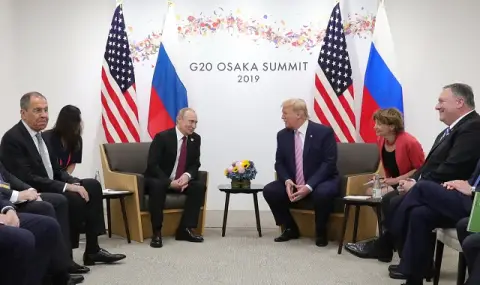Donald Trump is sending signals that he would agree to an option acceptable to Russia for ending the war in Ukraine. But if the carrot doesn't work, he may also reach for the stick. What does this mean?
The new American president threatened Russia with a reduction in oil prices. He would ask OPEC and Putin's main export commodity would fall in price to $50 per barrel, or even less. Immediately after that came the statement that Trump wants to see Putin immediately, the war in Ukraine must be ended.
In response, Moscow announced that it had not received any concrete proposals so far. But what is more complicated – to convince Russia to cease fire or to force the Kremlin to sit at the negotiating table?
Massive media preparation
Even before Donald Trump's inauguration, his team began releasing various schemes to the media, based on which Washington intended to achieve an end to the war in Ukraine after January 20. The many options should inspire Putin and his entourage. It was assumed that the current front line could become divisive, that Ukraine would be offered to leave the occupied territories to Russia, that Kiev's European allies would not be allowed to the negotiating table.
However, every time after the good cop in the media, the bad one appeared: Washington would force Russia to agree to peace, Trump was ready to allow any weapon to be used against the internationally recognized territory of Russia, and he could also start providing weapons to the Ukrainians even more generously than Biden.
Moscow responded through its "talking heads" and also filled the international media with versions: Putin was ready for negotiations without preconditions, the Russian side assumed that Ukraine would cease to exist by the end of the year, no territories would be returned - Moscow even wanted Kherson and Zaporozhye.
In the end, Donald Trump himself spoke. He openly made it clear that he was ready to accept an option that was advantageous to Moscow and even criticized Ukrainian President Zelensky in an interview for having decided to go to war with a much stronger opponent, Russia. At the same time, however, a clear scheme has been prepared for Putin - either the imminent start of negotiations, or new sanctions and suppression of oil prices, which will seriously hit the Russian budget.
The Kremlin is holding out for now. They do not want to give up on negotiations there. Putin most likely has a negotiating position, and a more compromising one than his summer ultimatum, according to which Russia wants to receive, in addition to the already conquered territories, two more regional centers - Kherson and Zaporozhye - without a fight.
But Putin obviously does not want to start negotiations under pressure. Therefore, in order to avoid a full-scale conflict, in response to Trump's new sanctions threats, Moscow makes it clear that nothing was expected from the American leader in the first place. It is clearly easier for the Kremlin to argue about whose contribution to the victory over Nazism is greater than to have a substantive conversation now, even taking into account that Zelensky is already proposing a return to the 2022 dividing line, that is: Russia should be left with the annexed Crimea and most of the Donetsk and Luhansk regions.
Backstage negotiations
It is quite possible that this set of seemingly contradictory statements from all sides is related to the fact that negotiations are not really on the agenda for now. Over the past decades, the world has become accustomed to the fact that traditional diplomacy has almost died, serious issues are not resolved by stern men and women in suits behind closed doors, but by public figures seeking to please the public, who conduct negotiations almost completely openly.
However, in the case of Ukraine, this will clearly not be the case. First, against the backdrop of the “public” negotiations at the beginning of Russia's full-scale aggression, which were conducted in Belarus, as is known today, were much more productive and pragmatic meetings in Istanbul. Second, the recent agreement between Israel and Hamas was also reached behind closed doors. And third - one cannot help but believe the new head of American diplomacy, Secretary of State Marco Rubio, who directly said that peace talks in Ukraine simply cannot be public.
Is there a chance for peace?
In other words, we see only decorations. The media often become a tool in the hands of politicians, who use them to gauge the reactions of the other side.
It seems that in reality the process is taking place in some other dimensions, that some people are secretly flying to the USA, and "mysterious individuals" are holding talks now in Istanbul, now in Dubai.
And if Trump's tough approach proves to be convincing enough for the Kremlin - and above all, without an alternative, and if, what is even more important, Putin himself is basically "ripe" for agreements, then in the coming weeks we can definitely expect a phone call from the Kremlin to the American president. And then their meeting. Moreover, its results may turn out, unexpectedly for many, to be agreed in advance and not through publications in the media like those that the public is now following with bated breath.
